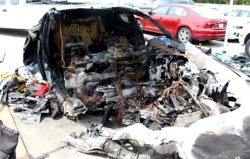— A Tesla Model S lawsuit has been filed by the parents of 18-year-old Barrett Riley, who was killed in a May 2018 fiery crash in Fort Lauderdale, Florida.
The father, James Riley, owned the 2014 Model S when the high-speed crash occurred and killed Barrett and his passenger, Edgar Monserratt.
In March 2018, Barrett Riley received a speeding ticket while driving the car 112 mph in a 50 mph zone, so his parents allegedly contacted Tesla and requested that a speed limiter be installed on the car.
According to the lawsuit, the speed governor allegedly would limit the car from going beyond 85 mph, and Tesla allegedly confirmed in writing the limiter had been installed.
Between March 9 and April 3, 2018, the 2014 Model S allegedly had to be worked on by the Tesla service department because it would not start, and the plaintiffs say the main battery pack had developed a short and needed to be removed and shipped to California.
The plaintiffs say once the battery pack service had been completed, Tesla allegedly removed the speed limiter after Barrett Riley took the car back to Tesla. This was allegedly done without the permission of Barrett's parents and they were not told the limiter had been removed.
According to the lawsuit, the crash occurred when the Model S accelerated to a high rate of speed and lost control, traveling over a curb and sideswiping a wall before the car crashed into a curved wall in front of a house.
The lawsuit alleges the second impact with the curved wall occurred at a "typical highway speed (or lower) – and at a reasonably foreseeable speed for an accident to occur. However, the batteries located at the front of the vehicle immediately erupted in flames."
The plaintiffs say the Model S traveled back into the road, went over a curb and hit a metal light pole, engulfing the front of the car in flames. The lawsuit also alleges the crash was "entirely survivable" because Barrett was wearing a seat belt and protected by airbags, but it was the battery fire that killed him.
In addition to the raging fire, the door handles allegedly failed to extend and made it impossible for firefighters to rescue the occupants.
The Model S is equipped with a huge battery that contains more than 7,000 lithium-ion battery cells in 16 modules that can burn at extreme temperatures for long periods of time.
TESLA’s Emergency Response Guide allegedly says battery fires can take up to 24 hours to extinguish, and it can take 3,000 gallons of water applied directly to the battery to fully extinguish a fire.
The parents allege Tesla knew the batteries were dangerous and prone to "thermal runaway" that quickly engulfs the vehicles. In addition, the lawsuit alleges the automaker waited years to do anything to prevent thermal runaway, much too late for the 2014 Model S.
According to an investigation conducted by the National Transportation Safety Board (NTSB), Barrett Riley was driving 116 mph on a 30 mph road three seconds before the crash. Two second before impact the car was going 108 mph when the driver hit the brakes and changed the angle of steering, and the airbags deployed as the car was traveling 86 mph.
Witnesses to the crash reported the Model S traveled at a high rate of speed into the left lane to pass another car but lost control while moving to the right lane.
In addition to the lawsuit filed by Barrett's parents, the family of passenger Edgar Martinez, 18, also sued Tesla claiming their son was killed due to defective batteries in the Model S. Another 18-year-old, Alexander Berry, was in the back seat and survived after being ejected in the crash.
The Barrett Riley Tesla crash lawsuit was filed in the Superior Court of the State of California, County of Santa Clara - James B. Riley, v. Tesla, Inc, et al.
The plaintiff is represented by Walkup, Melodia, Kelly & Schoenberger, and Colson Hicks Eidson.

